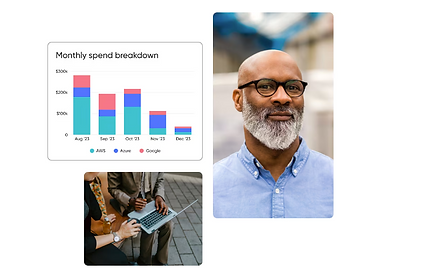ServiceNow Solution Delivery Manager

ITSM
ITSM is foundational to the ServiceNow platform. ITSM was initially rolled out to IT in 2019 and then rolled out to the overall business. Align and prioritize work for enhancing and maturing incident management, change management, problem management. Linking knowledge base articles to Incidents for faster resolution. Ongoing enhancements include Service Operations Workspace with Cisco Finesse integration for call Interactions. Leveraging Performance Analytics for KPI and SLA reporting.
Contract and Vendor Management

VRM - Vendor Risk Management and Contract Management Workflows
Using ServiceNow for managing the full cycle of contract and vendor management. Implemented Vendor Risk Management (VRM) application for evaluating and monitoring vendor risk. Implemented catalog items and workflows for vendor onboarding and contract management lifecycle. Implemented Vendor Manager Workspace to assign assessments to vendor managers to monitor and manage vendor performance and provide better visibility. Initial implementation in March 2020. Migration to TPRM (Third Party Risk Management) in late 2024.
Business Continuity Management (BCM)

Initially implemented the Maestro scoped application for business continuity management in August 2019. Migrated to the BCM application in jUne 2022. The migration from Maestro to BCM included the evaluation and adoption of new processes to align with out of the box capabilities and best practices. Engaged implementation partners for Maestro and BCM implementations. The BCM implementation helped prioritize CMDB data population and validation to provide the data needed for BIA (Business Impact Analysis) and Disaster Recovery Plan owners to select dependent Business Applications and Application Services for their Business Processes.
Strategic Portfolio Management (SPM)

Formerly known as ITBM (IT Business Management), the SPM implementation started with demand and project, followed by portfolio management, project risk scoring and financials. Scope included all IT projects in 2019 and selected business projects in 2020. Engaged implementation partner for initial implementation. Implemented AgileDev and Test Management for work management in 2022. SPW (Strategic Planning Workspace) was implemented in 2023. Further enhancements include triage board, Azure DevOps integration and Enterprise Agile Planning.
Common Service Data Model (CSDM)

CSDM 3.0 for Business Application and Application Service data in 2024 including Data Certification for populating and validating application metadata. This effort drove the priority for CMDB data cleanup, data ownership, data governance and application mapping to infrastructure. Moved application data out of legacy application Casewise into ServiceNow. CSDM 4.0 for life cycle management to provide the foundational data for implementing Enterprise Architecture (formerly known as Application Portfolio Management APM) and asset lifecycle management. Preparing for CSDM 5.0 with new organization for "digital products".
Knowledge Management

Using Knowledge Base for self service knowledge base articles. Multiple knowledge bases for IT and the business. Leverage KBAs for self-service training and reference materials. Experimented with using knowledge base for collaborative document management. Developed knowledge base articles and user guides for support and self service for various modules and catalog items. Linking knowledge base articles to incidents for faster resolution. All new catalog item workflows are supported with one or more KBAs.
Service Catalog

100+ Service Catalog items for IT and the business. For relevant catalog items, migrated to App Engine scoped apps for better reporting. App Engine also provides unlimited custom tables.

HRSD
Implemented Case Management and Knowledge Management in HR Service Delivery in 2023. Also implemented Job Descriptions workflows (revisions, approvals, alignment to job categories) and provided a series of training sessions and support for organizational adoption.
Upgrades

Yearly cadence for family upgrades. Including Zurich, Yokohama, Washington, San Diego, Quebec, Orlando, Madrid releases. Work with business owners to engage testers to identify and run regression test cases. Alternate sub-prod development environments to continue development and testing during code freeze. In most cases, upgrades do not incorporate new functionality in order to reduce risk for the upgrade and reduce load on developers and testers. New functionality is captured and prioritized on the ServiceNow program roadmap.
Vendor and Implementation Partners

Vendor management for ServiceNow Premier implementation partners. Evaluate and engage implementation partners including requirements definition, quotes, contract, burn rate, invoicing and deliverables approval. Manage vendors for professional services contractors for architecture, development and system administration.
Using TPRM for vendor engagements and custom workflows with integration to TPRM for contract lifecycle.
Program Management

Align and prioritize multiple workstreams and modules. Manage and prioritize roadmap for demands, projects and operational workstreams. Work with executive management to align priorities across the organization in Steering Committee sessions. Identify dependencies. Provide regular updates to team and senior managers. Align the platform with organizational goals for critical day to day operations and digital transformation. Manage and coach team for agile delivery, resource management and prioritization.
ITAM

Implemented ITAM in 2023 for Software Asset Management (SAM Pro) and Hardware Asset Management to manage asset lifecycles, entitlements and risk. Reporting for compliance and audit is aligned to NIST National Institute of Standards and Technology. Leveraging Content Data Service to auto populate software product models as part of Technology Reference Model (TRM). Using Technology Portfolio Management (TPM) for risk and lifecycle management for end of service / life for software products.
Integrations

Integration with Tenable scans to create vulnerabilities incident tickets in ServiceNow to manage the Tenable vulnerabilities. Workflow includes creating vulnerability tickets, auto assignment, manual close and auto close when Tenable scan auto closed the ticket.
Salesforce integration is being assessed for value to the organization (reduce "swivel chair" between systems, auto populate data between systems), cost to implement (license cost, development effort, cost to support).